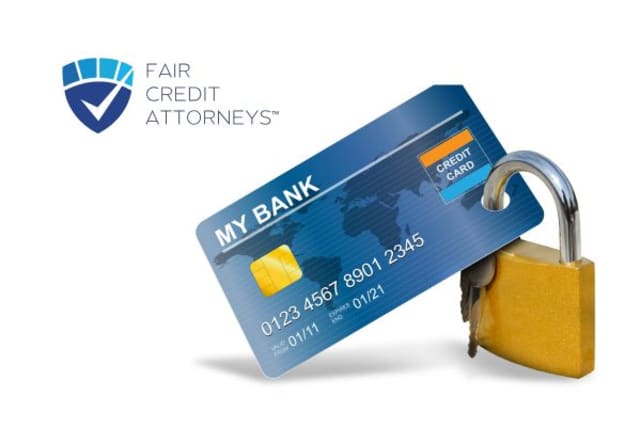Locking your credit is a key step in protecting your finances. With frequent data breaches and threats, securing your financial information is essential. Identity theft is rising and typically begins withttps://consumer.ftc.gov/topics/identity-thefth someone misusing your Social Security number to open fake accounts, seriously damaging your credit score and causing credit report errors.
The good news is that securing your financial accounts doesn’t have to be complicated. A credit lock or credit freeze, often referred to as a security freeze, is the digital equivalent of deadbolting your financial profile. It prevents lenders and other third parties from accessing your credit files to open new accounts in your name. This is your first line of defense against identity theft.
Ready to take immediate action? Don’t wait for a suspicious bank statement or a shocking drop in your credit scores. Start by contacting the Fair Credit Attorneys today.

How a Credit Lock or Security Freeze Works
While the terms are often used interchangeably, there’s a subtle distinction between a credit lock and a security freeze.
- Credit lock: is a paid service often offered by the credit reporting companies (like Equifax, Experian, and TransUnion) as part of a credit monitoring or identity protection package. It’s typically very quick to set up and remove via a mobile app or online portal.
- Security freeze: (or credit freeze) is required by federal law and is free for everyone. It provides the same essential protection: blocking access to your credit report. You must place the request separately with each of the three major consumer reporting agencies. Both are highly effective at preventing identity thieves from opening accounts. For the strongest and most cost-effective protection, the security freeze is the go-to choice.
The Power of Prevention
Think of your credit report as a file cabinet containing all your sensitive financial history. When a lender receives a credit application for a new line of credit or an auto loan, they request a look inside that cabinet. When a freeze is active, the cabinet is locked, and the lender can’t access your information.
This means no one can get a new credit card, an auto loan, or use buy now, pay later (BNPL) platforms in your name. If a criminal attempts to use your information, the application will simply be denied because the lender cannot check your creditworthiness. This is the simplest, most effective way to prevent identity theft.
Contact: Fair Credit Attorneys offer free consultations
Step-by-Step: Requesting Your Security Freeze
The process of placing a security freeze is straightforward, though it requires contacting each of the three major credit bureaus individually. This simple action immediately erects a powerful wall around your sensitive financial data.
Contacting the Credit Reporting Agencies
To fully protect yourself, you must contact all three major credit reporting agencies. You’ll need to submit an online form, mail a written request, or request your security freeze by phone. Be prepared to provide basic details like your name, address, date of birth, and Social Security number for identity verification.
- Equifax: Look for their credit freeze page or security freeze portal online.
- Experian: They offer a straightforward process for placing a security freeze.
- TransUnion: Follow their prompts to request a security freeze online or via mail.
Once you’ve submitted your request, the credit bureaus must process it within certain timeframes. They will provide you with a confirmation of the placement and a unique PIN or password you’ll need to use to “thaw” or remove the freeze later.

Essential Identity Verification Documents
To ensure they are speaking with the real you, the agencies may require proof of your identity and current address. Have copies of the following ready:
- A copy of a government-issued identification, such as your driver’s license or state ID card.
- A copy of a document showing your current mailing address, like a utility bill, bank statement, or insurance statement.
- Your full Social Security number.
The Protected Consumer Freeze for Minors
Child identity theft is a devastating and often undiscovered crime. Because most parents don’t check their child’s credit, identity thieves can use a minor’s clean credit history for years. If your child is under 16, you can request a protected consumer freeze on their minor’s credit report. This process often requires more documentation, including proof of your authority to act on their behalf (e.g., birth certificate). It’s a vital layer of identity protection for the whole family.
Related: Learn more about if you need a lawyer for identity theft.
Temporarily Lifting Your Freeze
A freeze is a powerful tool, but it’s not permanent. You’ll need to temporarily lift, or “thaw,” it when you apply for new credit, such as a credit card, auto loan, or mortgage. You will use the PIN or password you received from the credit reporting agency to submit an unfreeze request.
When you lift the freeze, you can choose to do it for a specific timeframe (e.g., 24 hours, one week) or for a specific creditor. Remember to re-freeze your files immediately after the credit check is complete. This quick step maintains your strong security posture.
Beyond the Freeze: Additional Protection
While a security freeze is paramount, there are other steps to enhance your identity protection plan:
- Credit Monitoring Services: These services, sometimes included with your bank or insurance, can alert you to changes in your credit profile and provide your monthly FICO® credit scores. They can offer alerts about new accounts, changes to existing accounts, or if your personal information is found on the dark web monitoring lists.
- Dispute Center: Regularly check your credit report annually (which you can do for free). If you spot errors or suspicious activity, use the dispute center on each agency’s website to report and fix them.
- Identity Theft Report: If you do become a victim, immediately file a police report and an FTC identity theft report. This documentation is crucial for clearing your name and credit files.

Taking Control of Your Financial Future
Don’t let the fear of data breach paralyze you. Learning how to lock your credit is the single most important action you can take to control your financial life and minimize the risk of identity theft. You’ve worked hard for your good credit score—protect it. This process is free, quick, and gives you incredible peace of mind.
Feeling overwhelmed by credit card debt or need help managing your finances? Exploring debt management or understanding how to improve your scores with a FICO® Score Simulator can be the next step toward financial wellness.
Ready to secure your future? Reach out to Fair Credit Attorneys at (866) 381-6444 today to discuss your credit issues further.
FAQs
- When should I consider hiring an attorney if I’m a victim of identity theft? Placing a credit freeze is something you can do yourself, but the fallout from identity theft can become overwhelming fast. You should consider consulting an attorney if you face severe financial losses, if creditors or credit reporting agencies refuse to remove fraudulent accounts after you’ve filed disputes, or if you are being aggressively pursued by debt collectors for debts you do not owe. An attorney can also be essential in complex cases involving tax-related ID theft or if you believe a company’s negligence (like a data breach) was responsible for your loss.
- How can an attorney help me clear fraudulent activity from my credit report? While you can file disputes on your own, an attorney brings legal weight and knowledge of the Fair Credit Reporting Act (FCRA). They can manage all communications with the credit bureaus and creditors, ensure they follow the law when investigating disputes, and quickly escalate the matter if they fail to act. An attorney can also negotiate directly with debt collectors to stop unlawful collection activities and may file a lawsuit if your rights as a consumer are violated.
- Can a lawyer help me place a credit freeze on a minor’s credit report? Yes, an attorney is particularly helpful in complex situations like placing a protected consumer freeze on a minor’s credit report. The credit reporting companies often require specific, sometimes difficult-to-obtain, legal documentation to prove a parent or guardian has the authority to act on a child’s behalf. A lawyer can ensure all documentation is correct, handle the necessary filings, and compel the agencies to place the freeze promptly, safeguarding your child from child identity theft.



